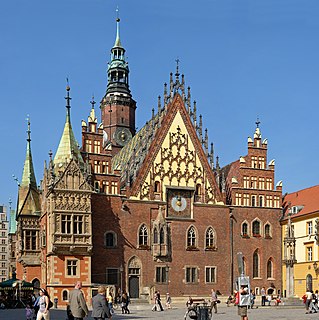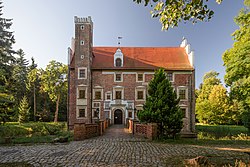| Wojnowice | |
|---|---|
| Village | |
Castle | |
| Coordinates: 51°12′07″N16°47′45″E / 51.20194°N 16.79583°E Coordinates: 51°12′07″N16°47′45″E / 51.20194°N 16.79583°E | |
| Country | |
| Voivodeship | Lower Silesian |
| County | Środa Śląska |
| Gmina | Miękinia |
| Population | 333 |
Wojnowice [vɔi̯nɔˈvit͡sɛ] (German : Wohnwitz) is a village in the administrative district of Gmina Miękinia, within Środa Śląska County, Lower Silesian Voivodeship, in south-western Poland. [1] Prior to 1945 it was in Germany.

German is a West Germanic language that is mainly spoken in Central Europe. It is the most widely spoken and official or co-official language in Germany, Austria, Switzerland, South Tyrol (Italy), the German-speaking Community of Belgium, and Liechtenstein. It is also one of the three official languages of Luxembourg and a co-official language in the Opole Voivodeship in Poland. The languages which are most similar to German are the other members of the West Germanic language branch: Afrikaans, Dutch, English, the Frisian languages, Low German/Low Saxon, Luxembourgish, and Yiddish. There are also strong similarities in vocabulary with Danish, Norwegian and Swedish, although those belong to the North Germanic group. German is the second most widely spoken Germanic language, after English.
Gmina Miękinia is a rural gmina in Środa Śląska County, Lower Silesian Voivodeship, in south-western Poland. Its seat is the village of Miękinia, which lies approximately 13 kilometres (8 mi) east of Środa Śląska, and 20 kilometres (12 mi) west of the regional capital Wrocław.

Środa Śląska County is a unit of territorial administration and local government (powiat) in Lower Silesian Voivodeship, south-western Poland. It came into being on January 1, 1999, as a result of the Polish local government reforms passed in 1998. The county covers an area of 703.7 square kilometres (271.7 sq mi). Its administrative seat and only town is Środa Śląska.
It lies approximately 5 kilometres (3 mi) north-east of Miękinia, 16 kilometres (10 mi) east of Środa Śląska, and 19 kilometres (12 mi) north-west of the regional capital Wrocław.

Miękinia is a village in Środa Śląska County, Lower Silesian Voivodeship, in south-western Poland. It is the seat of the administrative district (gmina) called Gmina Miękinia. Prior to 1945 it was in Germany.

Wrocław is a city in western Poland and the largest city in the historical region of Silesia. It lies on the banks of the River Oder in the Silesian Lowlands of Central Europe, roughly 350 kilometres (220 mi) from the Baltic Sea to the north and 40 kilometres (25 mi) from the Sudeten Mountains to the south. The population of Wrocław in 2018 was 639,258, making it the fourth-largest city in Poland and the main city of the Wrocław agglomeration.
The village has a population of 333.




